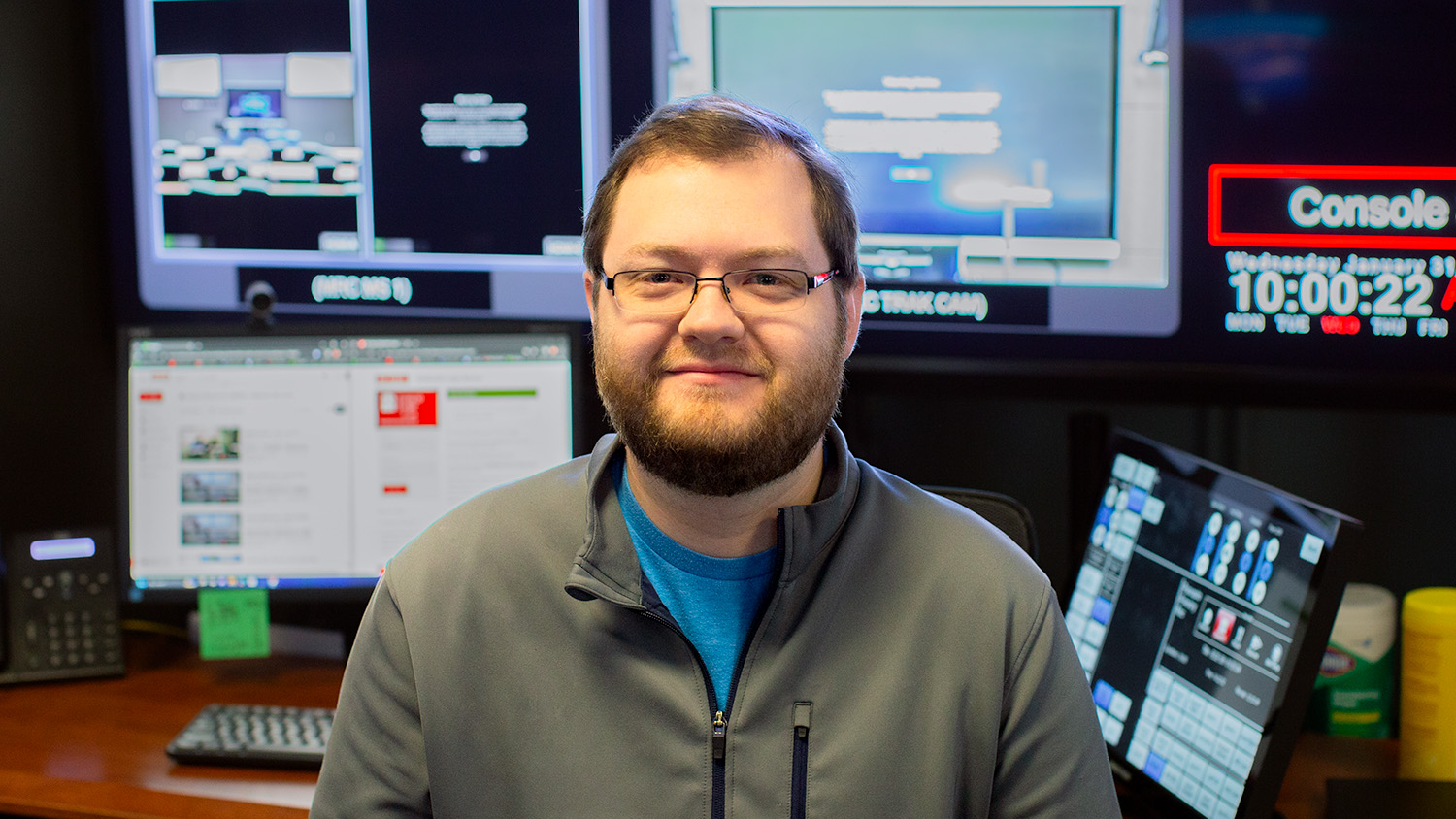DELTA Celebrates 15 Years
DELTA, NC State’s division for Distance Education and Learning Technology Applications, marked its 15th anniversary Aug. 12 with a celebration in the Hunt Library.
“DELTA is a key innovator and facilitator at NC State—its impact on campus has been enormous and wide-ranging,” said Provost Warwick Arden. “Distance education course-delivery options and trends have changed dramatically in the last 15 years and DELTA has remained on the leading edge of this transition, which means that NC State has remained on the leading edge.”
Arden and Chancellor Randy Woodson were among the 130 faculty and staff who attended the event.
History of Innovation
DELTA’s top administrator, Senior Vice Provost Tom Miller credits then-Provost Kermit Hall with envisioning the future of distance education in 2000.
“Kermit had this idea that technology and instruction was going to be a big thing,” Miller said. “He saw that the integration of technology-based teaching and learning into the academic fabric of our traditional programs was going to be a real opportunity, the big opportunity. He called it time-enhanced learning.”
Hall and Miller considered online learning a valuable way to give students flexibility. And they saw it as an additional channel to deliver education, not as a stand-alone approach.
“It really captures what the power of technology and education is,” Miller added. “It improves your time efficiency because you have the flexibility to choose when you listen to the lectures and when you do the work. You are not spending time driving back and forth to campus for every class, so the time-enhanced part, the learning efficiency part, was the big thing. We both agreed this was going to be transformational.”
Armed with Hall’s vision and passionately believing the future growth in higher education would be in teaching and learning with technologies, Miller took the helm of what would soon become DELTA. After a year as interim director, he was selected to lead DELTA permanently.
DELTA Expands
Miller quickly pulled together components from across campus to enhance DELTA’s capabilities (see timeline). He acquired staff from the Continuing Education Studies unit housed in McKimmon Center and from Learning Technology Services in the D.H. Library. Then he added the College of Engineering’s Video Communications Services.
With the merger of these units, DELTA became a driving force in moving distance education and teaching with technology to the forefront of the university.
The goals of increasing access and maintaining quality in a cost-effective way remained unchanged for the start, although the terminology did change. “Originally we were going to be called DELT, but I added the A for applications, which describes a lot of what we can do with technology today,” Miller explained.
Building a Culture of Innovation
Since DELTA was formed by joining multiple existing units, there were some growing pains. All of the units had their own culture, for example. But, Miller said in a phrase that would become the division’s trademark, “DELTA means change.”
“Blending a family isn’t easy, but we have adapted to the change and successfully merged three cultures into a new DELTA culture,” said Kay Zimmerman, associate vice provost for marketing and development.
“Our culture is a melting pot of expertise,” Miller added.
Lou Harrison, director of Educational Technology Services, has been with DELTA since 2001. He found the organization unique from the start.
“The synergy of making technology, which is necessary for distance education, available to the rest of the university is one of the things that makes DELTA special.
“Another factor is that we’re outside the chain of command of commodity IT, so, when there’s a problem with email or phishing or paychecks, we don’t get pulled away from our focus on technology for teaching and learning. That, along with Tom’s and Dr. Hall’s vision, is the special sauce that makes DELTA what it is.”
Leading the Way
From the beginning, DELTA has focused on helping faculty deliver high-quality NC State education no matter what the delivery method. What DELTA provides is a way to extend the reach of our NC State faculty so that they can deliver the same high-quality education that is available on campus to students all over North Carolina and around the world.
Before DELTA existed, there were few programs available to provide faculty with skills in teaching and learning with technology, said Donna Petherbridge, associate vice provost for Instructional Technology Support and Development.
DELTA quickly ramped up services to provide faculty with one-to-one assistance, showing them how to teach effectively with technology.
“We upped our game when more instructional designers were hired,” she explained.
As swiftly as technology moved from VHS tapes to DVD, DELTA had to adapt, too. “We spent a lot of money on tape and disk duplicating and postage as well as personnel time,” Miller said. “We even had a special contract with FedEx due to the sheer volume we were handling.”
Although the DVD phase didn’t last long before classes moved online, it was a big transition from DELTA’s beginnings.
Riding the Technology Wave
The increase in the number of faculty requesting classroom recording services led to creativity and planning in the Video Communication Services area. In 2012, a central control room (CCR) model came to fruition in the renovated Ricks Hall Annex space. CCR allows staff to remotely monitor and control all 11 DELTA classrooms scattered across campus. Starting with two consoles, there are now six consoles used to observe four classes at a time on each console.
As DELTA was building up its services, Web tools were getting better, too. Miller explained. “We went from postage stamps and dial up to delivering content online. We evolved significantly as the demand increased.”
He noted that higher education benefitted from the surge of the gaming and entertainment industries that were leading the way in capabilities.
In the beginning, the NC State-developed WolfWare was used as the first learning management system (LMS) on campus. WebCT was the first LMS purchased to deliver classes.
“In the early days, there was no integration with Registration and Records,” Petherbridge said. “That has changed tremendously.”
With the addition of a team of developers and information technology staff, DELTA moved the LMS to Moodle in 2009 as the enterprise-level LMS at NC State, supporting both online and traditional course formats.
One-Stop Shop
DELTA has grown into a one-stop shop for faculty services ranging from the LearnTech Help Desk and training to multimedia services and course production to the Testing Center.
“Many graduate students do not realize they may use DELTA services,” explained Stacy Gant, director of Instructional Support Services. “Our goal through the Knowledge Base we provide on delta.ncsu.edu, along with the training and walk-in Help Desk hours, is to give people the tools for teaching and learning with technology.”
“I love seeing the great things we do for faculty and students,” said Laura Stephenson, who has worked with Miller since he developed Multicast Backbone (MBone) in the College of Engineering before the days of DELTA.
Stephenson, senior coordinator for content capture enterprise support, said, “We used to record in specific Distance Education classrooms. Since 2013, Mediasite, our content capture system, has been made available for any classroom with the equipment to do the same thing.”
The recently launched My Mediasite enables faculty members to upload and record to Mediasite from remote locations.
Distance Education Student Services Moves In-House
At first, all Distance Education student services were outsourced, but by 2006 the need to have these services housed within DELTA was apparent. The growth in 15 years from serving around 300 students to now serving more than 19,000 a year could be overwhelming if not managed well. Continued growth in distance education is evidenced by the number of classes and sections offered, numbering more than 1,800 during the 2014-15 school year.
Rebecca Swanson, associate vice provost for Distance and Distributed Education said, “The mission and vision have modified some with the increase in numbers, but the commitment to service is the core of DELTA and informs everyone’s work.”
This fall DELTA is moving the Centennial Campus Testing Services into a new facility, doubling capacity.
“DELTA is a case study of an organization that provides an entire package of support to faculty from instructional designers to support and teaching,” adds Swanson. “This model is unique to NC State and stands as an example for other universities to implement a suite of services to faculty who are teaching with technology.”
Still Evolving
“The maturation of the technology is huge,” Swanson added. “We offer courses now that would not have happened five to six years ago.”
For Miller, DELTA still means change.
“I do not believe that distance education is a 100 percent replacement to face-to-face education,” he said. “But I do believe it provides a level of flexibility and access that is important to today’s students.”
DELTA strives to be aware of technologies and learning pedagogies to advance student outcomes. Each area within DELTA, from providing training in teaching with technology and the HelpDesk to creating a better user experience for the NC State community through WolfWare to accessing learning management systems, looks forward.
“As we look at 15 years, we are proud about how we adapt and how we inspire others. It is exciting to look back and see what we have accomplished,” Zimmerman said. “DELTA means adapting to change and with Tom’s leadership approach that understands the present, but looks toward the future, we are still evolving.”
- Categories:


